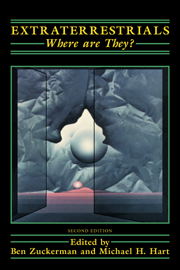Book contents
- Frontmatter
- Contents
- Preface to the Second Edition
- Preface to the First Edition
- 1 An Explanation for the Absence of Extraterrestrials on Earth
- 2 One Attempt to Find Where They Are: NASA's High Resolution Microwave Survey
- 3 An Examination of Claims that Extraterrestrial Visitors to Earth Are Being Observed
- 4 The Likelihood of Interstellar Colonization, and the Absence of Its Evidence
- 5 Pre-emption of the Galaxy by the First Advanced Civilization
- 6 Stellar Evolution: Motivation for Mass Interstellar Migrations
- 7 Interstellar Propulsion Systems
- 8 Interstellar Travel: A Review
- 9 Settlements in Space, and Interstellar Travel
- 10 Terraforming
- 11 Estimates of Expansion Timescales
- 12 A Search for Tritium Sources in Our Solar System May Reveal the Presence of Space Probes from Other Stellar Systems
- 13 Primordial Organic Cosmochemistry
- 14 Chance and the Origin of Life
- 15 The RNA World: Life before DNA and Protein
- 16 The Search for Extraterrestrial Intelligence
- 17 Alone in a Crowded Universe
- 18 Possible Forms of Life in Environments Very Different from the Earth
- 19 Cosmological SETI Frequency Standards
- 20 Galactic Chemical Evolution: Implications for the Existence of Habitable Planets
- 21 The Frequency of Planetary Systems in the Galaxy
- 22 Atmospheric Evolution, the Drake Equation and DNA: Sparse Life in an Infinite Universe
- About the Editors and Contributors
- Author Index
- Subject Index
4 - The Likelihood of Interstellar Colonization, and the Absence of Its Evidence
Published online by Cambridge University Press: 20 October 2009
- Frontmatter
- Contents
- Preface to the Second Edition
- Preface to the First Edition
- 1 An Explanation for the Absence of Extraterrestrials on Earth
- 2 One Attempt to Find Where They Are: NASA's High Resolution Microwave Survey
- 3 An Examination of Claims that Extraterrestrial Visitors to Earth Are Being Observed
- 4 The Likelihood of Interstellar Colonization, and the Absence of Its Evidence
- 5 Pre-emption of the Galaxy by the First Advanced Civilization
- 6 Stellar Evolution: Motivation for Mass Interstellar Migrations
- 7 Interstellar Propulsion Systems
- 8 Interstellar Travel: A Review
- 9 Settlements in Space, and Interstellar Travel
- 10 Terraforming
- 11 Estimates of Expansion Timescales
- 12 A Search for Tritium Sources in Our Solar System May Reveal the Presence of Space Probes from Other Stellar Systems
- 13 Primordial Organic Cosmochemistry
- 14 Chance and the Origin of Life
- 15 The RNA World: Life before DNA and Protein
- 16 The Search for Extraterrestrial Intelligence
- 17 Alone in a Crowded Universe
- 18 Possible Forms of Life in Environments Very Different from the Earth
- 19 Cosmological SETI Frequency Standards
- 20 Galactic Chemical Evolution: Implications for the Existence of Habitable Planets
- 21 The Frequency of Planetary Systems in the Galaxy
- 22 Atmospheric Evolution, the Drake Equation and DNA: Sparse Life in an Infinite Universe
- About the Editors and Contributors
- Author Index
- Subject Index
Summary
According to several estimates, up to 0.5% of all stars could have a planet similar to our Earth, but on the average about four billion years older than Earth, because our Sun is not an old star and star formation was most productive in the early times. Regarding the origin and evolution of life, our own case is at present the only instance of life we know of. Are we permitted to generalize this single case? Can we do statistics with n = 1? The laws of statistics say that n = 1 yields an estimate for the average, but none for the mean error (which would need at least n = 2). This means that assuming us to be average has the highest probability of being right, but we do not have any indication of how wrong this may be. Leaving statistics and arguing by analogy, we may add that most things in nature do not scatter over too large a range, up to a few powers of ten, mostly. Thus, the best we can do is to assume that we are average, but to allow for a wide (but not infinite) error of this assumption. If we now generalize our own case, then life in our Galaxy would have started on about one billion planets several billion years ago. And, arguing by extrapolation, we should expect this life to have developed meanwhile extremely far beyond our own present state.
- Type
- Chapter
- Information
- ExtraterrestrialsWhere Are They?, pp. 29 - 33Publisher: Cambridge University PressPrint publication year: 1995



